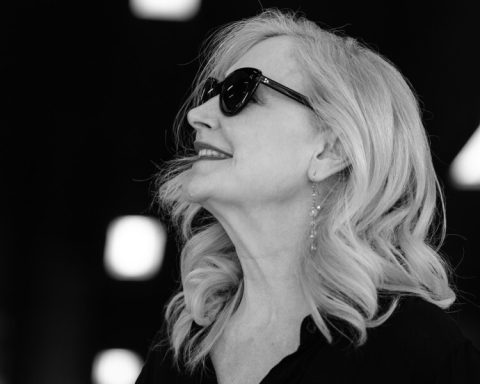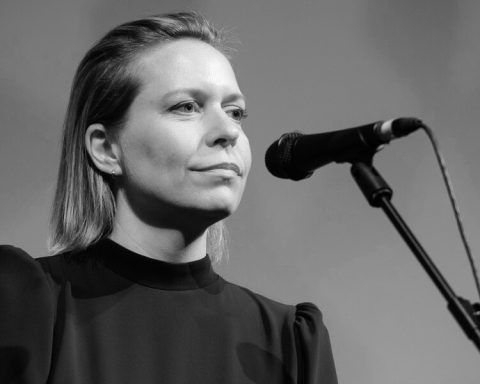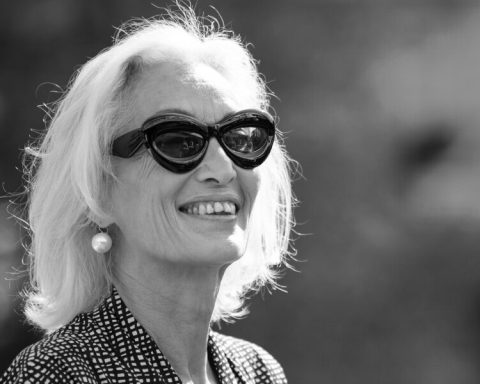In her directorial debut You Sing Loud, I Sing Louder, starring Clara and Ewan McGregor, Dutch US-based director Emma Westenberg follows a father who secretly drives his estranged daughter to rehab after an overdose episode, aware that she has inherited his addiction problems and after he had started a new family elsewhere. The film premiered at this year’s SXSW and subsequently played at the Karlovy Vary International Film Festival.
You Sing Loud, I Sing Louder was a project Clara McGregor and Vera Bulder, who founded together the production outlet Deux Dames Entertainment in 2020, came up with. Then, “Ewan read it and he liked it. He got Killer Films on board. He was just making something else with them. So, they all teamed up and then they were looking for a director and Vera and I had met in Amsterdam and we had worked together on things and so, she put my name in the hat. Then, I pitched to them how I would rewrite the script and how I would want to film it stylistically, but also working with improv’,” she says of how she came on board the film.
You Sing Loud, I Sing Louder is a road movie with a gritty subject that not only deals with addiction and self-harm, but is also about restoring family bonds, “The script was very much about addiction, but I wanted to make it more about their relationship because I think that any kind of addiction comes from this emptiness –an absence of something. And then, you try to fill that with other things. So, I think it was this absence that I wanted to put the emphasis on but, at the same time, I think a lot of movies about substance abuse are really dark. But it’s not how life is. There’s so much humor and strangeness and absurdity in every journey that I wanted to show that so that you really feel the complexity of a relationship like that, where you feel so much love for somebody, but then they also hurt you,” she explains.
In that sense, the family bond in need of restoring is part of a father-daughter dynamic – a father and a daughter who are estranged, but who know each other extremely well, “At first, it starts off really coldly between them because he’s trying, but he also, of course, knows that he has been away for a while. So, he is trying, but is also hesitant, and she is just closed off. She’s like, ‘This guy hasn’t been there and I’m not expecting anything.’ But then, because they are traveling and because she knows she has flaws as well, she starts to open up to him. Confronting the new wife, telling her about rehab was really important in the story, because instead of the problem being about addiction, it’s more about this feeling of absence and betrayal. I think what is important in this story, is that okay, you can blame your parents for a long time, but at some point, you have to let go and make your own choices,” she says.
Because the film is loosely based on the real-life father-daughter relationship between Ewan and Clara McGregor, Westenberg admits that she discussed it quite a lot with the McGregors due to the extremely personal aspect of the story, “But they were so fearless. They haven’t experienced the movie, but they were open to use their emotions because it’s a story that a lot of people go through. I think in the form of the movie, it is so clearly fictional, that they were just like, ‘We’re going to pull from our relationship’ and they made that very clear in the beginning, and it was also something that we were constantly talking about; that we could talk about it if it was too far, but that never happened,” she shares.
The characters don’t have a name and the film starts in media res, with the elephant in the room hovering over the story for quite some time, “When Clara started the project, she wanted to make something with her father. They based it on some of the things that they went through to somehow keep it personal, but also have it as a relatable story. We didn’t want to characterize them and give them fictional names. Also, because it’s not necessarily because they’re father and daughter; it’s a different context for them,” she elaborates.
The film has an utterly dreamlike aesthetic, with a blurred line between fiction and reality, interspersed with strange characters they meet along the way, “Because they are so strange at first these characters that they meet along the way, they change their relationship every time, but they’re also kind of mirrors of parts of them in different parts of the story and show different parts of them and set different things in motion. You don’t really notice it, but you don’t really see any horizons. In the beginning, there are a lot of top shots and a lot of close ups and there are not really a lot of shots of them together. And it’s all kind of dry and because when you are dealing with addiction it is very inward and it seems like there’s no way out because you need this thing. And then, he says it in the movie – when you embrace something bigger than yourself, whatever that is, it doesn’t have to be anything religious, it can be whatever, you start to see how big the world is and it can give a lot of relief. I think nature plays a big part in that for me. So, at some point, the horizon opens up and the characters in the world become more colorful and more dreamlike because she kind of opens up. So, it was her inner landscape that we were depicting, where it was kind of dry and dark in the beginning and it then becomes more colorful and more open,” she explicates.
Westenberg is a feminist in that she is a working woman in the film world, “It’s hard because there’s so many connotations with a word like that, because it’s political and it changes meaning always. But I definitely wish that we could all have the same chances… Being a woman, you have to be so much as a director too, because as a woman in power you get criticized a lot; there are so many things you have to navigate. But I don’t know how it is to be a man. So, it might be hard, too,” she concedes.
Westenberg moved to the United States because the opportunities were better and more plentiful there. She also professes her admiration for Israeli commercial director Alma Har’el who started “Free The Bid” after denouncing the lack of women in the world of commercials. “She went to all these production companies and to all the agencies and she was like ‘We need a debate.’ There’s a lot of female directors. It’s not like they’re not there, but I think men are very more easily granted the money and people think that they are more capable in higher positions, I guess. I don’t know what it is. But she made a huge impact. She’s really an icon.”
For her next project, Westenberg would like to combine the visual aspect of a film with the intimacy of a drama. Her dream project is to emulate one of her “all-time favorites ever”, Moulin Rouge, with a musical dance epic written by Cassidy Ball. She is also writing a horror film and is working on a Dutch film, “also a musical set in the red-light district in Amsterdam. It’s about two gangs and then two boys who fall in love with each other,” she concludes.
Photo credits: KVIFF.
This interview was conducted at the 2023 Karlovy Vary International Film Festival.










